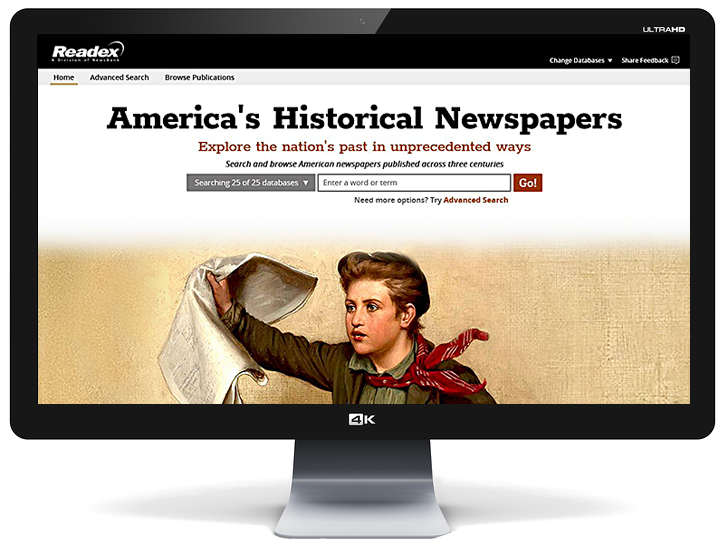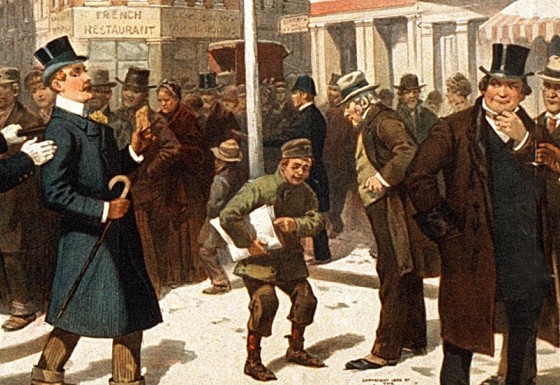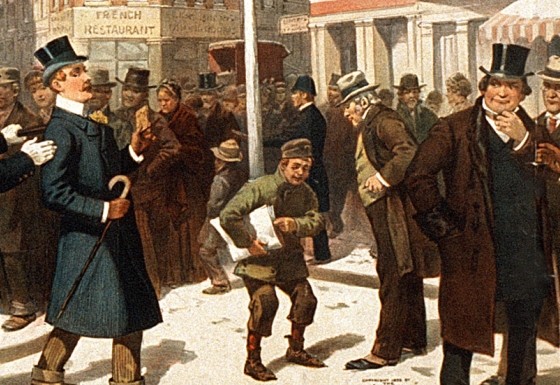
Early American Newspapers: Series 11, 1803-1899
From Agrarian Republic to World Power
- Now available to students and scholars — 130 titles from all 50 U.S. states
- Chronicles diverse facets of local, regional, and national U.S. history
- Expands the political and geographical breadth and depth of previous series
Early American Newspapers, Series 11, 1803-1899, provides online access to more than 130 titles from all 50 present states. Based on the renowned holdings of the American Antiquarian Society (AAS), Series 11 offers new coverage of diverse facets of local, regional, and national U.S. history, culture and daily life. Created for students and scholars in diverse academic disciplines, Series 11 also significantly extends the political and geographical breadth and depth of the 10 previous series of Early American Newspapers, 1690-1922.
Notable titles from across the nation
Among the titles in Series 11 are many of the better and more influential newspapers in each American region—publications that survived on their own merits after the first wave of less-popular titles in the region died out. Also included are elusive runs of especially noteworthy newspapers that have only recently become available: the New York Herald, which soon would have the largest circulation of any paper in the world; New York World, one of the most powerful political papers in America; Charleston Mercury, an early advocate of Southern succession; Cherokee Advocate, the first newspaper in Indian Territory; and Sacramento Daily Union, heralded as “The Oldest Daily in the West.”
Other notable titles in Series 11 include the Philadelphia Gazette, one of the most successful newspapers in the region during a time when Philadelphia was the second largest city in America; New Orleans Commercial Bulletin, offering unusually detailed economic coverage, including slave-trade pricing; Missouri Democrat, the most eminent conservative daily in St. Louis when the city was the main gateway to the West; Austin State Gazette, one of the most prominent newspapers in Texas from the pre-Civil War era until Reconstruction; Phoenix Herald, founded 33 years before Arizona became a state; and the Weekly Alta California, San Francisco’s populist and independent paper chronicling the transformation of San Francisco into a major city. Additional titles in Series 11, all included for the first time in Early American Newspapers, are the Lynchburg Virginian, North Carolina Standard, Washington Weekly Union, Christian Register, Louisville Democrat, Cherokee Phoenix and many others.
Superior bibliographic control
Like other Early American Newspaper series, Series 11 offers many significant titles listed in the authoritative bibliographies by Clarence S. Brigham and Winifred Gregory. A distinguished academic advisory board guided the title selection process.
An Archive of Americana® collection
As part of America’s Historical Newspapers, Early American Newspapers, Series 11, shares a common interface with all other Readex newspaper collections, enabling seamless searching with American Ethnic Newspapers, American Newspaper Archives, Caribbean Newspapers, and all previous series of Early American Newspapers.
The Early American Newspapers series is available within America’s Historical Newspapers.
Founding Newspapers from Every American Region
Political, Business and Religious Newspapers of the 19th Century
(Updated August 2016)
New York World (New York, NY; 1861-1876)
- The New York World was the leading national voice of the Democratic Party, and one of the most powerful and vehemently political newspapers in America. During this early run of the paper, during which the paper began its rapid rise, publisher Manton Marble used it to attack—often libelously—many non-Democrats, including President Abraham Lincoln, leading the President to send Marble to jail and place the paper under martial arrest. Soon freed, Manton and the World resumed publication and covered in detail the final years of the Civil War and the Reconstruction Era.
Sacramento Daily Union (Sacramento, CA; 1851-1875)
- Heralded as “The Oldest Daily in the West,” the Sacramento Daily Union was also one of the most successful and innovative papers in California. Its success following the gold rush enabled the paper to send reporters to every city in the state and beyond—one of them, Mark Twain, sent his dispatches in from Hawaii. Few other papers can rival the Daily Union’s coverage of the far West during this formative, frontier era.
Charleston Mercury (Charleston, SC; 1822-1852)
- One of the most influential newspapers in the South, the Charleston Mercury was an ardent defender of slavery and an early advocate of Southern secession. This run covers the decades when the Abolitionist Movement was gaining ground in the North, leading Southern papers like the Mercury to push ever harder to expand slavery into the Midwest. Other runs of the Mercury in Early American Newspapers include Series 3 (1854-1859), Series 7 (1860-1868); and Series 10 (Tri-Weekly Edition, 1831-1868).
The Cherokee Phoenix (New Echota, GA; 1828-1834)
- The first Native American newspaper in the United States, the Cherokee Phoenix was first printed in 1828 in New Echota, Georgia, the capital of the Cherokee Nation. At the time, the Cherokee Nation was under increasing pressure from the surrounding states, primarily Georgia, to either relinquish its sovereignty or move to a territory west of the Mississippi River. The Nation’s General Council established the Phoenix to gain public support and keep the Cherokee Nation united and informed during the crisis. This run spans the full range of the newspaper’s operations in Georgia as the Cherokees lost this political battle and were forced to move West.
Cherokee Advocate (Tahlequah, OK; 1845-1853)
- This was the first newspaper in Indian Territory, and the official newspaper of the Cherokee Nation. This run of the Advocate begins the year of its founding as the successor to the Cherokee Phoenix, and provides a Native American perspective on local and national news when the Cherokees and their fellow Native Americans were still reeling from their forced movement West as mandated by the Indian Removal Act of 1830. A later run of the Cherokee Advocate is found in Early American Newspapers, Series 2 (1871-1897).
The Philadelphia Gazette (Philadelphia, PA; 1803-1823)
- This was one of the most successful newspapers in the city during the early 19th century, when Philadelphia was the second largest city in America. A daily when most papers in America were weeklies, it chronicles in unusual detail a tumultuous era that included the political party warfare of the Early National era, the Louisiana Purchase, early exploration of the West, the War of 1812, and the completion of the Erie Canal. This run directly complements an earlier run in Early American Newspapers, Series 1 (1794-1802).
New Orleans Commercial Bulletin (New Orleans, LA; 1832-1871)
- This five-decade run of the Commercial Bulletin covers the economic and political history of New Orleans during the decades during which it rose to become the largest city in the South. In addition to local and regional politics, the New Orleans Commercial Bulletin contains unusually detailed economic coverage, including slave-trade pricing, general imports and exports, investment opportunities, wholesale prices, and shipping registers.
Daily Missouri Democrat (St. Louis, MO; 1857-1875)
- The most influential Conservative daily in St. Louis when the city was the main gateway to the West, the Missouri Democrat would later merge to form the Globe-Democrat, the most successful paper in the region for most of the 20th century. During the era covered here—leading up to the Civil War—the Democrat was the region’s most influential proponent of the abolition of slavery.
North Carolina Standard (Raleigh, NC; 1835-1850)
- The North Carolina Standard was one of the most successful and influential newspapers in the Raleigh, the state capital. During the era covered here, the Standard chronicles the debate and final adoption of the state’s new constitution in 1835, the re-building of the State Capitol after the great fire of 1831, and the economics and politics of the region’s tobacco industry and the slave trade on which it largely depended.
Phoenix Daily Herald (Phoenix, Arizona; 1879-1882)
- Founded 33 years before Arizona became a state, the Phoenix Herald provides a rare chronicle of the early exploration and development of this remote region of the Southwest. At the time these issues were published, Apache tribes still controlled much of the frontier, new arrivals from the East were beginning to farm the Salt River Valley, saloons far outnumbered churches, and the region’s boom was just beginning.
New York Herald (New York, NY; 1835-1840)
- Here are the elusive first five years of the New York Herald, widely considered to have been the greatest of all 19th-century American newspapers. It was certainly the most innovative: its publisher, James Gordon Bennett, almost single-handedly invented the modern newspaper, introducing police reports, society sections, detailed sports news, gossip columns and more. This run provides a detailed look at the newspaper that changed all future newspapers, and soon would have the largest circulation of any paper in the world. Other runs of the New York Herald in Early American Newspapers include Series 2 (1844-1874) and Series 4 (1874-1898).
State Gazette (Austin, TX; 1849-1867)
- The State Gazette was one of the most influential newspapers in Texas from the pre-Civil War era until Reconstruction. A political force in early Texas history, its editorial policy was to “oppose a high protective tariff, internal improvements at government expense and a banking system.” It also promoted states’ rights, called for the reopening of the slave trade in Africa, opposed the Compromise of 1850, and blamed the North for the slave problem because of northern reaction to the fugitive-slave laws. Other runs of the State Gazette in Early American Newspapers include Series 2 (1847-1867) and Series 12 (1857).
Lynchburg Virginian (Lynchburg, VA; 1828-1848)
- The Lynchburg Virginian chronicles the development of Lynchburg as one of the earliest 19th-century industrial centers in the region. Iron, steel, and tobacco processing enabled the city to become, by the 1850s, one of the richest towns per capita in the U.S. Although progressive, the paper covered all sides of the region’s often confrontational evolution from agriculture to industry.
Weekly Alta California (San Francisco, CA; 1865-1877)
- Populist, independent, and influential, the Weekly Alta California descended from the first newspaper published in San Francisco, and by 1865 it was the most powerful and admired paper in both the city and the state. This run chronicles the transformation of San Francisco into a major city, with massive expansion in all directions, political and economic battles over land and water, and ethnic conflict across the many immigrant groups that flooded into the region. Other runs of the Weekly Alta California in Early American Newspapers include Series 2 (1850-1854).
Washington Weekly Union (Washington, DC; 1845-1857)
- The Washington Weekly Union took center stage in Washington when the newly elected President, James Polk, made it his party’s official paper. Polk named as its editor one of the most famous journalists in the nation, Thomas Ritchie—who for 40 years had led another journalistic powerhouse, the Richmond Enquirer. Ritchie knew how to stir things up in Washington, and no paper surpasses the Union’s coverage of the political drama in the nation’s capital during this era.
The Christian Register (Boston, MA; 1821-1836)
- The Christian Register was the nation’s leading American Unitarian weekly, published by the American Unitarian Association in Boston. Typical issues of the Register contained essays by leading Unitarian theologians, as well as articles and opinion on the social and political issues of early 19th-century America. Other runs of the Christian Register in Early American Newspapers include Series 12 (1837-1878).
Louisville Daily Democrat (Louisville, KY: 1844-1867)
- The newspapers of Kentucky are of special interest for their coverage leading up to and during the Civil War, as Kentucky was one of the “Border States” — slave-holding states that did not secede from the Union. The Louisville Democrat is one of Kentucky’s most interesting newspapers in this regard, as under the editorship of John H. Harney it was at first a Union organ and later shifted position to become a leader of the Peace Democrats.
Stay in Touch
Receive product news, special offers and invitations, or the acclaimed Readex Report
Sign UpBy clicking "Sign Up", you acknowledge that you have read and understand our Privacy Policy and Terms of Use.





